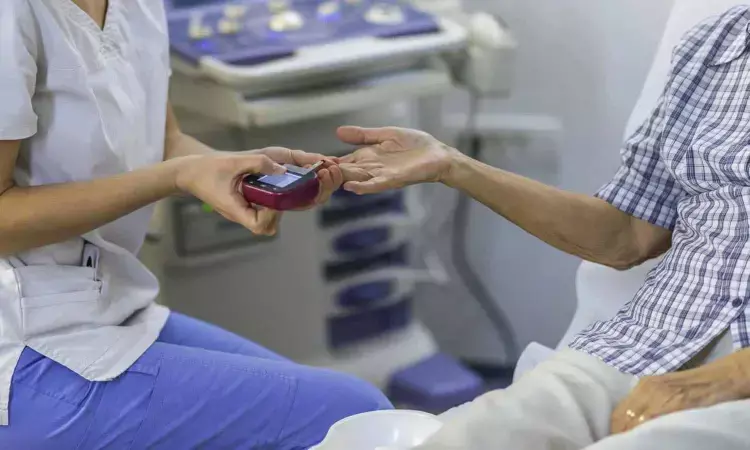- Home
- Medical news & Guidelines
- Anesthesiology
- Cardiology and CTVS
- Critical Care
- Dentistry
- Dermatology
- Diabetes and Endocrinology
- ENT
- Gastroenterology
- Medicine
- Nephrology
- Neurology
- Obstretics-Gynaecology
- Oncology
- Ophthalmology
- Orthopaedics
- Pediatrics-Neonatology
- Psychiatry
- Pulmonology
- Radiology
- Surgery
- Urology
- Laboratory Medicine
- Diet
- Nursing
- Paramedical
- Physiotherapy
- Health news
- Fact Check
- Bone Health Fact Check
- Brain Health Fact Check
- Cancer Related Fact Check
- Child Care Fact Check
- Dental and oral health fact check
- Diabetes and metabolic health fact check
- Diet and Nutrition Fact Check
- Eye and ENT Care Fact Check
- Fitness fact check
- Gut health fact check
- Heart health fact check
- Kidney health fact check
- Medical education fact check
- Men's health fact check
- Respiratory fact check
- Skin and hair care fact check
- Vaccine and Immunization fact check
- Women's health fact check
- AYUSH
- State News
- Andaman and Nicobar Islands
- Andhra Pradesh
- Arunachal Pradesh
- Assam
- Bihar
- Chandigarh
- Chattisgarh
- Dadra and Nagar Haveli
- Daman and Diu
- Delhi
- Goa
- Gujarat
- Haryana
- Himachal Pradesh
- Jammu & Kashmir
- Jharkhand
- Karnataka
- Kerala
- Ladakh
- Lakshadweep
- Madhya Pradesh
- Maharashtra
- Manipur
- Meghalaya
- Mizoram
- Nagaland
- Odisha
- Puducherry
- Punjab
- Rajasthan
- Sikkim
- Tamil Nadu
- Telangana
- Tripura
- Uttar Pradesh
- Uttrakhand
- West Bengal
- Medical Education
- Industry
High blood sugar level increases death risk even in non-diabetics: Study

Tel Aviv, Israel: High blood sugar levels (hyperglycemia) increases mortality risk, the risk being highest for those without diabetes and with controlled type 2 diabetes (T2D), suggests a recent study in the journal Diabetes/Metabolism Research and Reviews.The association between inpatient hyperglycemia and mortality is well-established. However. evidence is inconsistent on whether...
Tel Aviv, Israel: High blood sugar levels (hyperglycemia) increases mortality risk, the risk being highest for those without diabetes and with controlled type 2 diabetes (T2D), suggests a recent study in the journal Diabetes/Metabolism Research and Reviews.
The association between inpatient hyperglycemia and mortality is well-established. However. evidence is inconsistent on whether this association is different among those with and without T2D. Hana'a Rayyan‐Assi, Clalit Health Services, Tel Aviv, Israel, and colleagues therefore examined whether the association (between hyperglycemia and 30-day mortality) was modified by baseline blood sugar status.
The researchers performed a a retrospective cohort study of 174,671 eligible hospitalized patients between 2012‐2015. They assessed the 30-day mortality during the first inpatient stay up to 30 days post discharge. Using logistic regression models, the adjusted association between hyperglycemia and mortality was assessed.
Key findings of the study include:
- The multivariate model demonstrated a 2.18‐fold risk of mortality associated with hyperglycemia.
- Adding the interaction terms between hyperglycemia and baseline glycemic status the ORs of 30‐day mortality were 1.41 in non‐T2DM status, 1.32 in pre‐diabetes status, and 1.30 in unscreened status, as compared to T2DM status with hyperglycemia.
"We found that admission hyperglycemia was a significant and independent risk factor for mortality among all hospitalized patients, regardless of baseline glycemic status," wrote the authors.
"These findings may help medical staff identify potential increased risk of mortality upon hospital entry and discharge, and direct further research to assess how hyperglycemia control and proactive deterioration prevention throughout the entire inpatient stay may prevent adverse outcomes," they concluded.
The study, "The Relationship between Inpatient Hyperglycemia and Mortality is Modified by Baseline Glycemic Status," is published in the journal Diabetes/Metabolism Research and Reviews.
DOI: https://onlinelibrary.wiley.com/doi/abs/10.1002/dmrr.3420


